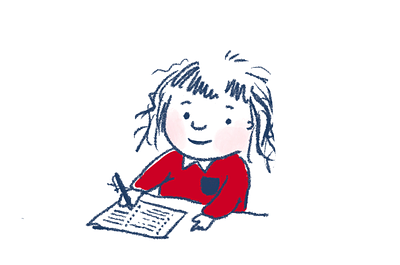Looking for all Articles by Abigail Balfe?
Abigail Balfe: What’s Your Story?
'No one can write quite like you can. And you don't need to write like anyone else does either.'

In this blog post, the author and illustrator of A Different Sort of Normal, Abigail Balfe, shares inspiring advice on becoming a writer and telling your story your way.
Everyone has a story to tell.
No matter how young or how old you think you are. No matter how easy or how hard you find writing or speaking. No matter how much or how little you think you've done or achieved or experienced.
We've all been on journeys to get to where we are today. And those journeys are all individual, important and cannot be replicated or replaced by anyone else.
My journey began 36 years ago. I was born. And then lots of other things happened after that. (Well I can't fit my whole life story into this blog post, can I?)
But I will tell you one major thing that happened when I was 33.
I was diagnosed as autistic.
I spent the majority of my childhood and adult life feeling awkward and out of place, like I didn't fit in, so when I received the news that my brain just worked differently to a lot of the people around me, it was as if all the difficult and confusing parts of my life suddenly started to make sense. Finally I had a reason for feeling different!
One thing that had always helped me process my thoughts and emotions as a child was writing and drawing. So after my diagnosis, I started scribbling my thoughts, feelings and memories into my sketchbook.



As the words and drawings came together, I realised that they were turning into a story.
A story that soon turned into a book…

A book that you can now find in shops and schools and libraries.
That book is called: A Different Sort of Normal.

A Different Sort of Normal is my real-life true story about growing up autistic and not knowing I was autistic. It's a story about being me. It's the story I know how to tell better than anyone else can. Because I am me!

Inside the book there are words and pictures and tales of cats, pianos, friendship, the Spice Girls, Craig David, school, college, emojis, periods, star signs, gender, sexuality, toilets and of course plenty of POO.
Writing A Different Sort of Normal was a bit like writing a diary. My writing style mirrors my thinking style, so jumps around all over the place – but still has somewhere to be and reaches it in the end.
Some people think you have to be good at spelling and grammar and have a wild imagination to be a writer – but you absolutely don't! At school you may learn rules to help shape your writing in order to do well in exams and to improve your likelihood of entering into certain careers, but writing itself is a very personal thing.
Your writing style is something unique to you. It's your voice and no one can tell you how to use that voice, apart from you.
When I was at school my teachers told me to avoid using long sentences, because my essays and stories were full of them. Apparently I would forget what I was saying by the time I'd reached the end of my sentences, but this is exactly how I speak in real life.

I tell my stories as things pop into my head, my mind goes off on tangents and my book replicates these thought processes in a similar way. It is full of rambling stories about things that have happened in my life such as the time I got locked in a cinema overnight, my dislike of toilets and my love of cats; it has helpful fact boxes about autism, silly footnotes about my dad and a mysterious tub of ice cream, and plenty of colourful doodles.


And the best thing is – the unique way I've written and structured my book is one of the things readers have loved the most! In fact, I have been told that it has actually made my book more accessible for children and adults who find reading difficult.
If I had listened to the teachers who told me how I should be writing, and how I should avoid drawing in a 'cartoon' style, I wouldn't have created A Different Sort of Normal.
No one can write quite like you can. And you don't need to write like anyone else does either.
Writing can be a wonderful form of escape, a way of processing our emotions whether through writing about your own experiences directly or by creating characters you can relate to in some way.

Our unwritten life stories can be opportunities to not only help us make sense of our internal worlds, but if we do decide to write and share them – they could even help someone else too.
You never know what could happen if you put pen to paper, hand to laptop, voice to recording device. You might just change your world for the better. You might help change someone else's world. Or you might just have a really fun time telling your story. I know I did.
